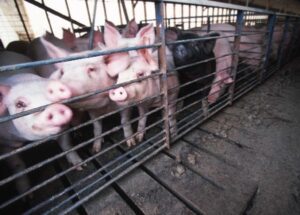Antibiotic-Resistant Bacteria Found in Nearly 50 Percent of Factory Farm Workers

Factory farm workers are being exposed to an increased risk of antibiotic-resistant bacteria, finds a new study.
A research team at the Johns Hopkins Bloomberg School of Public Health looked up the noses of hog farm workers in North Carolina and found that 86 percent of the workers carried staph bacteria in their noses—a number significantly higher than the general population.
The findings, published in the journal Occupational and Environmental Medicine, noted that close to half of the subjects had strains of antibiotic-resistant bacteria that were resistant to at least one type of drug. “The 10 workers found to carry the bacteria persistently had strains associated with livestock that were resistant to multiple drugs, and one also carried MRSA [methicillin-resistant S. aureus],” the New York Times reported. “Three more of the workers tested positive for strains of S. aureus that were not resistant to antibiotics. So in total, 86 percent of the workers in the study carried the S. aureus bacteria, compared with about one-third of the population at large, according to the Centers for Disease Control and Prevention.”
Other studies have suggested that the farm-borne pathogens would only survive in the noses of the farm workers for 24 hours. But that’s not what this study revealed. “This study, while small, is important because it shows the persistence of this bacteria for the first time in the U.S. setting,” Dr. Heaney told the Times. “If workers continue to carry it over a period of days, they are going to be interacting with their families and in their communities, and the question for public health officials then is whether they pose any greater risk.”
Find Jill on Twitter @jillettinger
Related on Organic Authority
‘Low Dose’ Antibiotics in Chicken Feed for Weight Gain Widespread, Investigation Finds
Put Down the Pork Chops! US Pork is Hazardous to Your Health
Antibiotic Resistance Now Kills More People than AIDS
Image: eutrophication&hypoxia

